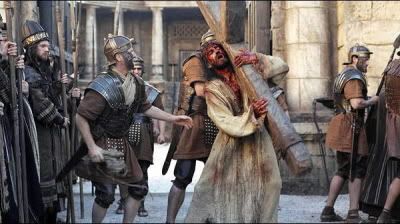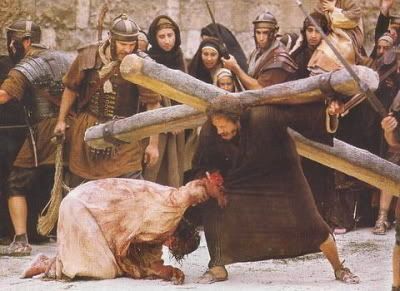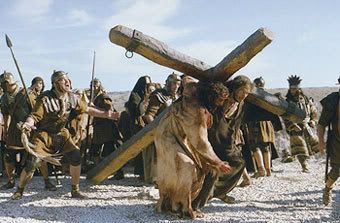
Sermon for 17 September 2006 (Yr B, Proper 19)
The cross is certainly unlike any other symbol in the world. The irony is that an instrument of suffering, fear, and death has become for so many a sign of strength, peace, and inspiration.
There is no substitute for experience, and it’s the same way with suffering. We have a great deal of respect for those who have suffered, particularly for those who have come out of suffering and can offer us hope and inspiration. Think of the situation of a cancer survivor visiting with someone just diagnosed. Experience doesn’t give us all the answers, but it does share insights. And so someone facing suffering wants to know, How did you do it? How did you deal with the fear? How did you cope with the pain?
It is part of our outlook as Christian people that life not only involves suffering, but that suffering has a value and meaning before God. It has dignity. This is part of the reason why the late Pope John Paul II touched so many lives even as this man who was once remembered as the youthful, vigorous, athletic pope began to age and fade away. Rather than hiding away in the Vatican during his final years, he chose to stay out there in front of the world, to embrace his own suffering and to let others see it’s dignity.
In the last visit to his homeland, he said, “My pilgrimage to Poland cannot go without a word to the sick, who are so close to my heart. . . . Every time I recite the morning, midday, and evening Angelus, I feel, dear fellow-countrymen, your special closeness to me. I unite myself spiritually with all of you. In a particular way I renew the spiritual unity that binds me to every person who is suffering, to everyone who is sick, to everyone confined to a hospital bed, to every invalid tied to a wheel-chair, to every person who in one way or another is meeting his cross.
"On his cross the Son of God accomplished the redemption of the world. It is through this mystery that every cross placed on someone’s shoulders acquires a dignity that is humanly inconceivable and becomes a sign of salvation for the person who carries it and also for others. 'In my flesh I complete what is lacking in Christ’s affliction' (Col 1:24), wrote St. Paul.

"Therefore, uniting myself with all of you who are suffering throughout the land of Poland, I beg you to make use of the cross that has become part of each one of you for salvation. I pray for you to have light and spiritual strength in your suffering, that you may not lose courage but may discover for yourselves the meaning of suffering and may be able to relieve others by prayer and sacrifice."
We see that suffering is a part of life; we know that is has redemptive value. And yet which one of us wants to hear painful news? (e.g., I’m sorry, but . . . You have cancer, Your husband is dead, I want a divorce, You will not be able to walk again, Your sight will not return, This is the end of our relationship; you’re no longer family.) Even Jesus prayed in the garden “Father if it be possible, let this cup pass from me; nevertheless, not as I will, but as you will.” (Mt 29:39).
Before his public ministry began, Jesus had a sure sense of his mission in life and that the Father’s will for him was to suffer. Just as he wants his disciples to understand who he is, Jesus wants to share that insight with them as well. And so, as Jesus continued his ministry with them through the Gentile territory of Caesarea Philippi, he stopped to ask them what they might have heard what impression he was making. “Who do people say that I am?” This episode is a key point in Mark’s telling of the gospel story. When Jesus asks them what their own view is, Peter speaks for the group and says, “You are the Messiah.”
Strangely, even though they apparently have the right answer, Jesus asks them to keep it quite (at least for the present time) for it might confuse people. We must understand that in the mindset of the time, “Messiah” and “suffering” simply did not go together. He must first lead them to a deeper understanding. Then Jesus began to teach his disciples “that the Son of Man must undergo great suffering, and be rejected by the elders, the chief priests, and the scribes, and be killed, and after three days rise again. He said all this quite openly. And Peter took him aside and began to rebuke him."
We can already see how this conflicting concept of a suffering Messiah was going to confuse people. In Mark’s gospel, it is only understood after the cross. Peter would not hear it—he took Jesus aside and told him, Lord, you don’t know what you’re talking about! Truth be known, how often have you and I reacted like Peter? We have all heard that the first stage of grief is denial, but it still surprises us. “Not when it comes to me,” we think. The bad news is not for me. “You don’t know what you’re talking about.” “What gives you the right?”
Priests encounter this type of thing regularly in the course of our ministries. Sometimes we have the hard job of bringing the reality of suffering before people in our flocks both as a congregation and as individuals—and it is painful each and every time. “No, I don’t believe you have a vocation.” “No, you have to forgive others before your own soul can start to heal.” “No, you cannot marry in the church.” “No, your situation will get worse before it gets better.” “No, you cannot just live together.” “No, you must follow through with this thing to the bitter end.” “No, what you’re doing is wrong, and you need to go to confession.” I’ve never come across anybody who wanted to hear any of that bad news. Perhaps we can understand why Peter pulled Jesus aside and started to rebuke him.
Like a faithful parish priest called upon to share with someone the hard facts, Jesus knows that he is showing the disciples something they do not want to see—the price of faithfulness, the cost of discipleship. The Messiah reigning on the throne with his elders, yes . . . that comes later, but Son of Man must first suffer greatly and be killed. "And when their done with me," he might as well have said, "they will be coming after you."

"If any of you want to be my disciples, take up your cross and follow me." In today’s language, he might as well have said, "There’s going to be an empty electric chair right up there next to mine, so if you really want to be close to me and if you want to be like me, why don’t you just come on up and have a seat beside me? Remember that Jesus was a carpenter; he did not work in sales.
He was a carpenter, who lovingly crafted the instrument of our salvation. He placed it on his back and carried it up to build his own altar. And there he laid himself down as the lamb of God, the one atoning sacrifice that makes peace with the Father and takes away the sin of the world—which is his own broken body and shed blood.
“If any want to become my followers, let them deny themselves and take up their cross and follow me. For those who want to save their life will lose it, and those who lose their life for my sake, and for the sake of the gospel, will save it. For what will it profit them to gain the whole world and lose their own soul?”
Have you denied yourself? Or have you denied your cross. As human beings, we each have our own crosses to bear—our sufferings. To be Christian disciples means to embrace these gifts and to bring them up with him before God the Father to offer in sacrifice.
The starting point is to deny ourselves. You want a deeper relationship with Jesus? Do not embrace your vanity. Start by saying “No” to your own self-love. Say “Yes” to Jesus by first saying “No” to the idol of the ego.
Peter had objected to the bad news of Jesus dying--and thus of their own dashed hopes of reigning over a newly independent kingdom of Israel. Jesus responded that Peter and each of the disciples must embrace the cross as well. That is, they must be willing to die to themselves in every—even physically. The most of the apostles and many early Christians did just that—by torture, fire, by lions. Are we willing to suffer humiliation for witnessing for Jesus--to die to our reputations? Are we willing to deny ourselves the pleasures of gossiping, lying, sexual immorality, and greedily pursuing wealth--to put them to death for the love of Jesus? Or will we be one of those Jesus says he will be ashamed of when he returns?
“Those who are ashamed of me and of my words in this adulterous and sinful generation,” Jesus said, “of them the Son of Man will also be ashamed when he comes in the glory of his Father with the holy angels." We are to take up our crosses. We are to show our faith by our works. We are to embrace our struggles, our pains, our sufferings, and join them to the cross of Christ—the one offering before God that makes all of them acceptable. We are to do without, in order to be with him.

“Those who want to save their life will lose it, and those who lose their life for my sake, and for the sake of the gospel, will save it.” It is our cross. Each of us must decide for ourselves. "We will glory in the cross of our Lord Christ, for he is our salvation, our life and our resurrection. Through him we are saved and made free" (Introit for Holy Cross Day).


No comments:
Post a Comment